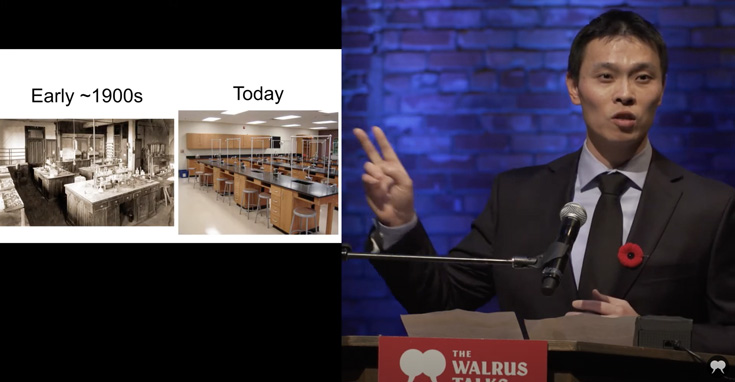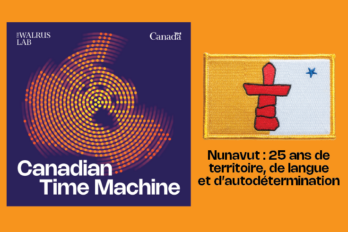HOST: In the midst of a pandemic, cancer remains one of the leading causes of death in Canada, so it makes sense that we have large laboratories for conducting cancer research. But according to Steve Shih, when it comes to building research facilities, bigger is not always better. This might be a moment (strategically) to think small. Welcome to The Conversation Piece. This is Steve Shih.
STEVE SHIH:
Good evening. My name is Steve Shih. Cancer. It’s probably the biggest C in this room today. I personally have a story with cancer, and I’m sure some of you here also has a story with cancer. Cancer essentially affects everybody. It doesn’t matter if you’re a celebrity, you’re an artist, you’re an athlete. It does not have a preference, but given the state of technology of today, why is cancer still so very prevalent? And still one of the leading causes of death in our society of today? Now, if you want to study cancer, you must first know that cancer is a genetic disease. It starts with a small benign cell and over generations, it starts to form this huge cell mass, essentially a malignant tumour. For some of us, we can eradicate these cells, but unfortunately for some others, these cells stay and start to spread at different parts in their body.
So some would say that these cells or cancer for that matter are essentially deadly. It ruins all the normal functions of human life. Now I’m not a doctor. I’m not even a biologist. I’m actually an engineer, specifically an electrical engineer, but my interests lie in interdisciplinary knowledge, trying to bridge the gap between science and engineering, using interdisciplinary skills, engineering tools, and skills that I’ve learned in the past, trying to solve major challenges that we have in health and in medicine. Currently, I’m a principal investigator at a laboratory at Concordia and my students and I are trying to advance cancer research by developing new cancer tools for detection. So the question is, how are we going to do that?

Well behind me, I show you two images of scientific laboratories. One that has shown a hundred years ago. And one that has shown today, if you take a closer look at these images, you’ll notice that well, there is that they’re actually very similar. All the structure of the labs, the tools that we use, the glass where, uh, they’re all very similar. What surprises me the most is the biological and chemical processes that we use in these laboratories. They’re essentially the same. Actually. Some of the procedures that I use are essentially as old as my dad, but, but in terms of cancer, these scientific laboratories made a grossly inaccurate and highly expensive to study cancer. So how are we going to change all that? Well, there’s a man, well sort of motivated our work Gordon Moore. And he created this law called Moore’s law. For those of you that don’t know Moore’s law, essentially what it states is that the smaller, the transistor that we can make, the more transistors we can fit on electronic chip. So the more transistors we can fit in an electronic chip, the more processing power, the more computational operations we can process. And we already seen sort of the results of this instead of those old bulky cell phones that can only dial a phone number. Now we have these nice sleek cell phones can take the nice, beautiful pictures can sort of follow our friends, our Facebook, or a thousands of miles away, or even follow our favourite politicians south of the border, their Twitter feeds.
But for us, instead of miniaturising electronics, what we’re essentially doing is miniaturising laboratories that will fit essentially right in the palm of your hand. If you think back to your, to your high school days, when you did a science experiment, what you’re essentially doing is manipulating fluids, such that you can create a variety of liquid concoctions, whether you’re putting liquids into your class where, or merging or mixing different liquids together and analysing those liquids in your glassware. Well now with these, what we call lab on chips, you can now automate all these fluidic processes just by a click of a button. Now, not only are you saving time and costs, but now you can analyse precious samples, just like cancer cells, and you can analyse many different samples at one time. So instead of a group of scientists looking at one scientific experiment, all I need now is one scientist to look at possibly thousands or even millions of scientific experiments at one time using a device, just like this one, right in the Palm of my hand.
But what does this mean in terms of cancer while cancer cells at the early stages are really difficult to detect. But if we miniaturise the laboratory to the dimensions of a cancer cell, we can trap the cells. We can understand the genetics and then really figure out what is causing a benign cell to form a malignant tumour cancer cells. In fact are all very different, but by using these labs on chips, we can analyse all these different cancer cells find out what is the commonality, and finally figure out the culprit genes that are affecting cancer. Now we’re not going to stop here. In fact, we want to use our laboratories for something else. We want to develop new personalised treatments for these cancer patients. We all know that the generalised treatments that we have for them today are essentially any effective there, they’re not killing cancer. Now, these devices that we have, they’re fast, they’re cheap, they’re robust, but most important. They’re sensitive to detecting cancer. Now my laboratory right now is looking at breast cancer, but we’re not stopping until we look at all types of cancers and hopefully eradicate them all together. Now, the next time you think about cancer, or even you speak about cancer, I want you to think small so that we can win big and hopefully eradicate cancer once. And for all, thank you so much.
HOST: Steve Shih is an Associate Professor of Electrical and Computer Engineering at Concordia University and he spoke at The Walrus Talks: Disruption in 2017. And he’s just one of the over 800 fantastic Canadians who have wheeled, walked, or virtually zoomed onto the stage at The Walrus Talks and The Walrus Talks at Home.
If you liked this episode, we’d appreciate it if you’d take a few moments to do these three things: subscribe, leave a rating and review, and share this episode with one of your loved ones.




